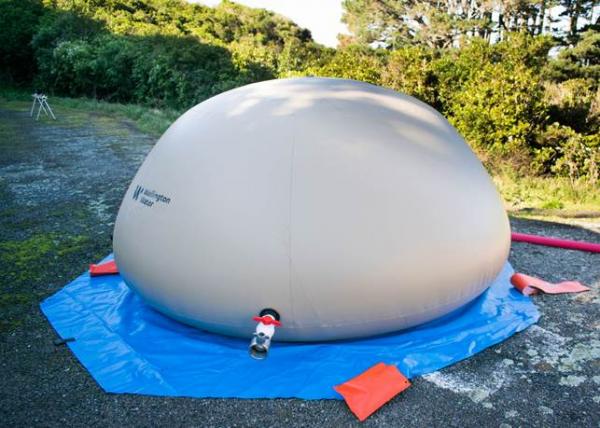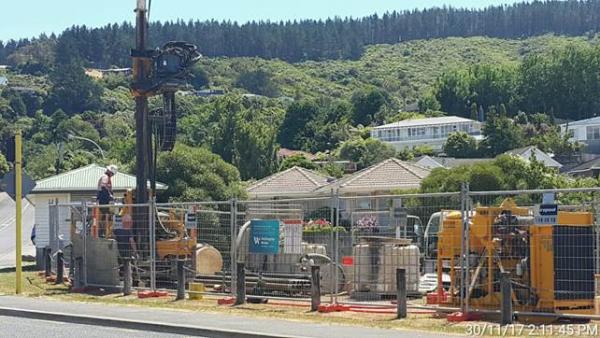Published 16/03/2018
Search for land-based emergency water sources nears completion
Wellington Water is close to completing its search for local water sources at parks, hospitals, and schools in metropolitan Wellington.
Drilling at 15 sites since last May has so far confirmed six locations for new emergency wells, part of an emergency network that will supply water from day eight after a major earthquake. Investigations at the final three sites will be completed by the end of the month.
Following a major quake, residential water supply could be out for up to 100 days or more in parts of Wellington. “The emergency network is part of a regional response to this,” says Wellington Water’s community engagement manager Alex van Paassen.
“But even if you live next door to one of these wells, people shouldn’t think they don’t need to do anything to be prepared at home, as it will take time to get the emergency network operating after an event.
“It’s vital that people know they’ll need to rely on water they’ve stored at home after an earthquake or other emergency. Having enough water stored at home is just part and parcel of being a Wellingtonian – you should be aiming for 20 litres for every person, per day, for those first seven days.”
As well as safe drinking water, households should have plans for what to do with toilet waste.
The emergency water network will supply more than 20 community water stations and 300 water collection points from wells, streams and rivers in Wellington, Porirua, Upper Hutt and Lower Hutt. It is the result of a partnership between all the four city councils and central government, and is aimed for completion in mid-2018.
“Our goal is to be able to supply every Wellingtonian with 20 litres of water every day, via these collection points. We’ve balanced the selection of locations against the supply of water available, population numbers, likelihood of damage to the roading network, and the location of existing reservoirs.”
The design of the network assumes the worst from a major quake, including that many parts of Wellington will be cut off from neighbouring suburbs. The water stations will help communities be self-sufficient for water supply, so people won’t be forced to travel across landslips or other potential hazards to collect water.
Alex van Paassen says a team of hydrogeologists analysed the Wellington region for potential water sources, and the drilling programme has investigated a total of 15 sites, starting at Kenepuru Hospital in May 2017.
The groundwater investigations were successful at six locations so far. Each new well needs to provide a minimum of one-to-two litres of water every second, have adequate water quality, and the support of each local council and the community for a water station to be established.
Groundwater investigations at Huntleigh Park in Crofton Downs, and Glenside Reserve began last week.
These sites will complete Wellington Water’s land-based drilling programme. If the groundwater is not suitable, alternative options will need to be considered around these sites. This includes mobile units to treat water from streams in a process similar to desalination.
“Establishing the emergency water network within just 12 months is an ambitious target. But resuming water supply to our customers is one of our highest priorities. It may’ve been some time since our last shake, but no one in Wellington should be thinking about ‘if it happens’ – a significant seismic event is inevitable for us.”
DRILLING FOR EMERGENCY WATER – OVERVIEW
A total of 15 potential groundwater sources were identified. Six new wells have been confirmed, and proposals to establish a community water station are in progress at these sites.
Drilling and testing is on track at a site near Aro Park.
Drilling has recently begun at two final sites – Huntleigh Park in Crofton Downs, and Glenside Reserve.
A total of six sites have been confirmed as new wells to supply emergency water.
The six confirmed sites for new emergency wells are:
- Postgate Park School (Porirua)
- Berhampore Nursery
- Hanson Street (Newtown)
- Linden Park (Tawa)
- Tawa Fire Station
- Truscott Avenue (Johnsonville)
Investigations are being finalised at the following three sites: Aro Park / Aro Valley Community Centre, Glenside Reserve, Huntleigh Park.
Some sites have been ruled out, due to an inadequate volume of water supply. These include: Nairnville Park, Kenepuru Hospital, Titahi Bay School, Pinehaven Library (Upper Hutt), Darwin Street (Karori), Middleton Road (Glenside).
COMMUNITY WATER STATIONS
- Proposals to establish the community water stations are under way across Wellington’s four city councils.
- More information and design concepts are available here: What is a community water station?
- Water at up to 13 water stations will be extracted from rivers and streams. On-site water treatment plants will be used to extract and supply treated water to communities.
- Decisions on the design and location of each water station are based on availability of water, site accessibility, and landowner preference.
WATER DISTRIBUTION NETWORK
- Emergency water bladders will be used to supply water from the community water stations and water collection points.
- More than 300 water collection points will be available across Wellington’s four cities.
- Small emergency water bladders will be fitted on to utes and trailers to transport water from reservoirs and water stations to collection points.
- There’ll be a collection point within one kilometre of every home.
- Wellington Water’s level of service through the emergency water network will provide 20 litres of water for every Wellingtonian every day.

Emergency water bladders will be used to supply water from the community water stations and water collection points. More than 300 water collection points will be available across Wellington’s four cities.

Drilling for groundwater at Tawa Fire Station in November 2017.
